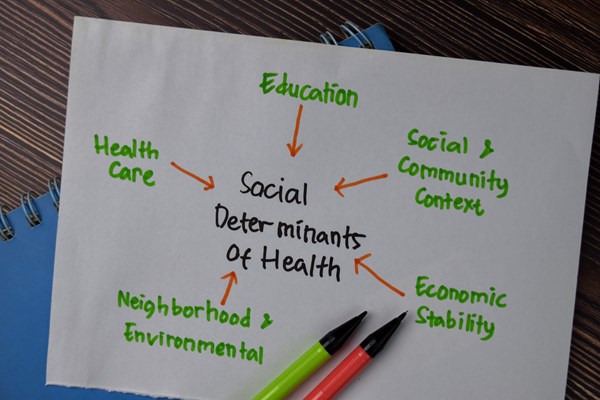Underutilized ICD-10 Codes Can Predict Higher Emergency Department and Hospital Utilization
Social determinants of health are an important and well documented driver of health care utilization and outcomes. The 2015 release of the tenth revision of the International Classification of Diseases (ICD) introduced the addition of Z-codes, which were developed to document social risks. These codes capture risk factors related to housing, employment, literacy, upbringing, and social support, and can be documented by both physicians and non-physicican providers such as nurses and social workers. However, Z-codes are severely underutilized in clinical care, possibly due to their voluntary nature.
In this study, patients with commercial insurance or Medicare Advantage plan were followed for up to 4 years to assess the relationship between Z-code assignment and subsequent emergency department and inpatient utilization. Most Z-codes were assigned during an outpatient office visit (55.1%) or outpatient hospital setting (22.9%) and less frequently during an inpatient stay (4.1%), emergency department visit (4.3%), laboratory (8.1%), or in another setting (5.5%). Patients were most frequently assigned codes related to community/social factors such as "problems in relationship with spouse or partner" (Z63.0, 12.1%) for those on the commercial plan, and "problems related to living alone" (Z60.2, 17.3%), and "homelessness" (Z59.0, 4.2%) for those on the Medicare Advantage plan. For patients in the commercial plan, Z-code assignment was associated with a 26% higher rate of emergency department visits and a 42% higher rate of inpatient admissions. For those in the Medicare Advantage plan, these rates were 42% and 28%, respectively.
In both groups, patients with documented social needs had higher emergency department utilization and inpatient admissions rates. It's important to note this dataset failed to capture uninsured patients who are more likely to have unmet social needs, so these rates may be an underestimate.
Z-codes can provide a better picture of patient's overall health and can be used to connect patients with appropriate resources and support groups. With the expansion of who can assign Z-codes and new CMS regulation to screen for social needs, staff from inpatient units, EDs, and laboratories can increase their documentation of social needs. As documentation of Z-codes increases, we may see the potential for Z-code use in risk adjustment and prediction models improve.
ABSTRACT
Liss DT, Kang RH, Cherupally M, Cooper AJ, Barreto-Parra PN, Aikman C, O'Brien MJ. Association between ICD-10 codes for social needs and subsequent emergency and inpatient use. Med Care. 2024;62(1):60-66.
Background: International Classification of Diseases, 10th revision Z-codes capture social needs related to health care encounters and may identify elevated risk of acute care use.
Objectives: To examine associations between Z-code assignment and subsequent acute care use and explore associations between social need category and acute care use.
Research design: Retrospective cohort study
Subjects: Adults continuously enrolled in a commercial or Medicare Advantage plan for ≥15 months (12-month baseline, 3-48 month follow-up)
Outcomes: All-cause emergency department (ED) visits and inpatient admissions during study follow-up
Results: There were 352,280 patients with any assigned Z-codes and 704,560 sampled controls with no Z-codes. Among patients with commercial plans, Z-code assignment was associated with a 26% higher rate of ED visits [adjusted incidence rate ratio (aIRR) 1.26, 95% CI: 1.25-1.27] and 42% higher rate of inpatient admissions (aIRR 1.42, 95% CI: 1.39-1.44) during follow-up. Among patients with Medicare Advantage plans, Z-code assignment was associated with 42% (aIRR 1.42, 95% CI: 1.40-1.43) and 28% (aIRR 1.28, 95% CI: 1.26-1.30) higher rates of ED visits and inpatient admissions, respectively. Within the Z-code group, relative to community/social codes, socioeconomic Z-codes were associated with higher rates of inpatient admissions (commercial: aIRR 1.10, 95% CI: 1.06-1.14; Medicare Advantage: aIRR 1.24, 95% CI 1.20-1.27), and environmental Z-codes were associated with lower rates of both primary outcomes.
Conclusions: Z-code assignment was independently associated with higher subsequent emergency and inpatient utilization. Findings suggest Z-codes' potential utility for risk prediction and efforts targeting avoidable utilization.
EMRA + PolicyRx Health Policy Journal Club: A collaboration between Policy Prescriptions and EMRA
 As emergency physicians, we care for all members of society, and as such have a unique vantage point on the state of health care. What we find frustrating in our EDs - such as inadequate social services, the dearth of primary care physicians, and the lack of mental health services - are universal problems. As EM residents and fellows, we learn the management of myocardial infarctions and traumas, and how to intubate, but we are not taught how health policy affects all aspects of our experience in the ED. Furthermore, given our unique position in the health care system, we have an incredible opportunity to advocate for our patients, for society, and for physicians. Yet, with so many competing interests vying for our conference education time, advocacy is often not included in the curricula. This is the gap this initiative aims to fill. Each month, you will see a review of a new health policy article and how it is applicable to emergency physicians.
As emergency physicians, we care for all members of society, and as such have a unique vantage point on the state of health care. What we find frustrating in our EDs - such as inadequate social services, the dearth of primary care physicians, and the lack of mental health services - are universal problems. As EM residents and fellows, we learn the management of myocardial infarctions and traumas, and how to intubate, but we are not taught how health policy affects all aspects of our experience in the ED. Furthermore, given our unique position in the health care system, we have an incredible opportunity to advocate for our patients, for society, and for physicians. Yet, with so many competing interests vying for our conference education time, advocacy is often not included in the curricula. This is the gap this initiative aims to fill. Each month, you will see a review of a new health policy article and how it is applicable to emergency physicians.



